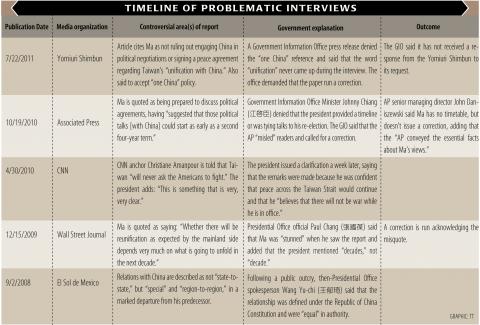Questions as to whether President Ma Ying-jeou (馬英九) was misquoted during an interview with foreign media are once again the subject of discussion, adding to a long string of back-and-forth mix-ups.
The Government Information Office (GIO) on Saturday asked a Japanese daily to run a correction on comments about cross-strait relations that were attributed to the president during an interview published last week.
A report by the Yomiuri Shimbun which said that Ma had accepted the “one China” principle was “inconsistent with the facts,” the GIO said, referring to the interview transcript that has since been posted on the Presidential Office Web site.

While the newspaper had yet to reply as of yesterday, the dispute comes in the wake of similar clashes over supposed comments made by Ma during interviews and reporting by foreign media outlets, almost all involving questions on Taiwan-China relations.
Since Ma was elected in 2008, the GIO and the Presidential Office have filed complaints with the El Sol de Mexico, the Wall Street Journal, CNN and The Associated Press, either saying that the president was misquoted or clarifying remarks ostensibly taken out of context.
The previous disputes took place after Ma conducted interviews in English, leading lawmakers from both camps to demand that future sessions take place in Mandarin over fears of misinterpretation to an international audience.
Conducted in Mandarin through a translator, the Yomiuri Shimbun report quoted the president as saying that he would “not rule out engaging China in political negotiations” or signing a cross-strait peace deal on the issue of unification with Beijing.
The Presidential Office transcript confirmed Ma as “not excluding” the two touchy subjects, but Government Information Office Minister Philip Yang (楊永明) maintained that the president did not talk about either the matter of unification or acceptance of the “one China” principle.
Ma only told the Japanese daily that relations would proceed under the principles of “one China, separate representations” and the “1992 consensus,” Yang said.
“There must be a reason why this has happened five times, and each time involving large international media companies,” DPP spokesperson Cheng Wen-tsang (鄭文燦) said, adding that the -international — and in some cases domestic — perception was that “one China, separate representations” and the “one China principle” were the same thing.
“As a result, the government should be questioning the clarity of its own cross-strait relations, including whether it has conveyed a consistent message internationally and within Taiwan,” Cheng said.
The newspaper on Thursday also questioned Ma about relations with Japan and the US, claims to the -Diaoyutai Islands (釣魚台) and his nuclear energy policy, but those areas did not come under dispute.
In an earlier statement, the DPP asked that the president be more careful when making remarks to the international press that could be construed as acceptance or even support of Beijing’s “one China” line and eventual political unification.
Huang Wei-cher (黃偉哲), a DPP legislator who has commented on past mix-ups, said that he did not see the latest dispute with the Japanese daily as unique.
“I think that we’ve seen this many, many times already. The reporting by a large internationally recognized media company and then the rushed denial by the government. This has led to questions — and concerns — about Ma’s cross-strait message,” Huang said.
Of the Yomiuri Shimbun controversy, he said: “I think the only thing left to do is simply to release the tapes.”

Taiwanese can file complaints with the Tourism Administration to report travel agencies if their activities caused termination of a person’s citizenship, Mainland Affairs Council Minister Chiu Chui-cheng (邱垂正) said yesterday, after a podcaster highlighted a case in which a person’s citizenship was canceled for receiving a single-use Chinese passport to enter Russia. The council is aware of incidents in which people who signed up through Chinese travel agencies for tours of Russia were told they could obtain Russian visas and fast-track border clearance, Chiu told reporters on the sidelines of an event in Taipei. However, the travel agencies actually applied

Japanese footwear brand Onitsuka Tiger today issued a public apology and said it has suspended an employee amid allegations that the staff member discriminated against a Vietnamese customer at its Taipei 101 store. Posting on the social media platform Threads yesterday, a user said that an employee at the store said that “those shoes are very expensive” when her friend, who is a migrant worker from Vietnam, asked for assistance. The employee then ignored her until she asked again, to which she replied: "We don't have a size 37." The post had amassed nearly 26,000 likes and 916 comments as of this

New measures aimed at making Taiwan more attractive to foreign professionals came into effect this month, the National Development Council said yesterday. Among the changes, international students at Taiwanese universities would be able to work in Taiwan without a work permit in the two years after they graduate, explainer materials provided by the council said. In addition, foreign nationals who graduated from one of the world’s top 200 universities within the past five years can also apply for a two-year open work permit. Previously, those graduates would have needed to apply for a work permit using point-based criteria or have a Taiwanese company

The Shilin District Prosecutors’ Office yesterday indicted two Taiwanese and issued a wanted notice for Pete Liu (劉作虎), founder of Shenzhen-based smartphone manufacturer OnePlus Technology Co (萬普拉斯科技), for allegedly contravening the Act Governing Relations Between the People of the Taiwan Area and the Mainland Area (臺灣地區與大陸地區人民關係條例) by poaching 70 engineers in Taiwan. Liu allegedly traveled to Taiwan at the end of 2014 and met with a Taiwanese man surnamed Lin (林) to discuss establishing a mobile software research and development (R&D) team in Taiwan, prosecutors said. Without approval from the government, Lin, following Liu’s instructions, recruited more than 70 software